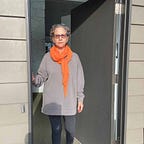The Bookmobile
A Wonderland on Wheels
The first public library I ever walked into was on wheels.
There was an elementary school, more than one synagogue and church, but no nearby library in the Brooklyn neighborhood of my early childhood years.
Situated on the edge of East Flatbush and Canarsie, that maze of 20 six-story buildings known as the Glenwood Houses would be something of an anchor for a neighborhood on the cusp of change. It was the 1950s and affordable, income-based public housing would be a big draw for middle-class families like mine. I was not yet seven, about to enter second grade, when we moved there. By the time I was in third grade, that thing we think of as independent reading began to kick in. By fourth grade it was something of a hunger.
My idea of manna was the Bookmobile making its weekly visit, etched in my memory as Wednesday.
The back door of the blue and white vehicle emblazoned with a Library on Wheels logo was for returning books. I walked up the steps, deposited the books I’d read. There was no lingering in this 20-by-8-foot dimly lit space, but ten minutes — just enough time to find something recommended or see what jumped out at me — could seem like a blissful eternity before exiting via the front end, filled with the anticipation of where the books I’d chosen would take me.
Every time felt like the first time — the wonder that so many books could exist about so many things, the growing awareness that stories could take me far beyond my circumscribed world. From a cultural standpoint, music and TV played a big part in my family life, books not so much. Newspapers — the Daily News, New York Post, National Enquirer — kept my parents engaged, though my father did read an occasional book, even bought me one, a collection of Hans Christian Andersen fairy tales that got me through my bout with measles.
Time has a way of shaping memories. On the day the Bookmobile came around (maybe Wednesday, maybe not), I see myself walking alone from the street on which I lived to the other end of the housing project, where it would be parked. Maybe I was alone, more likely not. But that sense of aloneness strikes at the chord of a young girl’s secret pleasure and the way her life is turned around by a library on wheels that first brought her Ramona and Pippi Longstocking, fictional girls who spoke their minds, did brave, sometimes nonsensical, things.
It doesn’t take much to imagine my thrill when construction began on a permanent library. More books. More choices. I could take out ten at a time for summer reading, sit on my favorite bench, in the shade of a tree overlooking a patch of grass. If books are the embodiment of shared stories, libraries elevate them to a collective consciousness. Someone else has held the book I’m now reading. I relished the slight crackle of the translucent, protective covers. The smell — not so much musty as reminiscent of aged wood — was an invitation: come inside, see what I have for you.
My first job would be at the new library. I was about to turn 16, my last year in high school. I would shelve books, check them in and out, do managerial tasks in the back office. The library manager would give me a lifelong lesson in learning to type, a skill not necessarily in the course listing for students on track for an academic diploma.
This week marks National Library Week, a celebration that began back in the 1950s out of concern that Americans were reading less and spending more time with their radios, televisions, and musical instruments. The American Library Association joined forces with American book publishers to form a nonprofit citizens’ organization called the National Book Commitee, which marked the first National Library Week in 1958 with the theme, “Wake Up and Read.”
This year’s theme, “There’s More to the Story,” taps into the bigger part libraries play in our lives, not the least of which is the ALA’s commitment to protect our freedom to read in light of the unprecedented attempts to ban books. Unite Against Banned Books is an ongoing initiative. Monday marked its first annual Right to Read Day.
Until two years ago, Wednesday of National Library Week was designated National Bookmobile Day. In the same spirit of expanding its reach to meet the times in which we live, the ALA reframed Wednesday to become National Library Outreach Day. If anything, it’s a rebranding that only heightens my appreciation for those oversize vehicles that make books available in hard-to-reach places of our country, not to mention the world.
